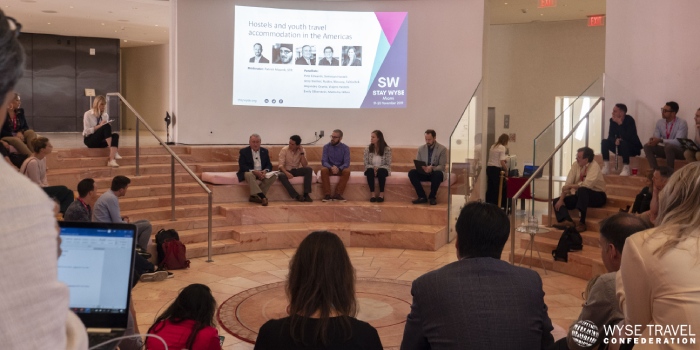Digital experience and human relationships: Hospitality trends in the Americas
On the first day of STAY WYSE Miami, a panel of experts hailing from different hospitality brands in North, Central and South America gave us their insights into current and future trends in the youth accommodation sector. Patrick Mayock, Senior Director of Research & Development of STR moderated the discussion.
Emily Silberstein explained how the Motto by Hilton micro-hotel concept came about, citing the rise of the lifestyle hostel as a source of inspiration for this more youth-focused brand. Lifestyle hostels respond to the increasing demand from young travellers for shared communal areas, a community feeling and local design and food and beverage offerings at their accommodation. She also added that 70% of young travellers are looking for cheaper ways to travel to urban destinations; Motto by Hilton is aiming to provide a solution by means of strategically picking locations for their micro-hotel that are attractive to this demographic and following the trend of significantly smaller room sizes and larger, more interactive social spaces.
Jerry Kremer, Ruskin, Moscou, Faltischek, P.C., assured us that hostels in the US are indeed ‘alive and well’. He went on to explain that while in Europe there are over 10,000 hostels, in the US that figure is just a fraction at around 300. However, developments are happening in the US, with brands such as Generator showing their confidence in this evolving market segment. ‘If there were more hostels in the US,’ he added, ‘there would be more young people traveling in the US.’
Alejandro Osorio of Viajero Hostels explained the humble roots of hostels in Latin America, beginning as family-owned properties offering accommodation to backpackers. Now, times are changing, and private equity funds across Europe and the US are slowly starting to bet on Latin America as a key youth travel destination – seemingly late to catch on to the huge potential of these territories.
Pete Edwards revealed that the key focus of Samesun Hostels is to tap into the digital nomad market, understanding what young travellers are looking for today and creating deliberate spaces from which they can work and interact. ‘Good, free WiFi is absolutely key to the digital nomad hostel experience’, he noted.
Something that became apparent from all speakers was the importance of smooth customer experience and maintaining human relationships in hostels. A seamless digital experience is key to attracting and retaining customers and providing a hassle-free stay. However, as explained by Emily Silberstein, ’introducing technology to improve this experience must not be a substitute for human contact’. Alejandro Osorio is keen to see the perception of hostels change and has high hopes that Viajero Hostels will become an ambassador for the word ‘hostel’.
Key takeaways from this panel:
- The hostel business in NYC is a USD 600M business; more hostels would be an attractive addition to the city – Jerry Kramer
- Latin America is the next big destination – Alejandro Osorio
- Gen Z is completely different to millennials in how they behave and how they access information; this is crucial to understanding youth travellers – Pete Edwards
- It is important not to lose sight of human connection and the sense of community that guests look for – Emily Silberstein

